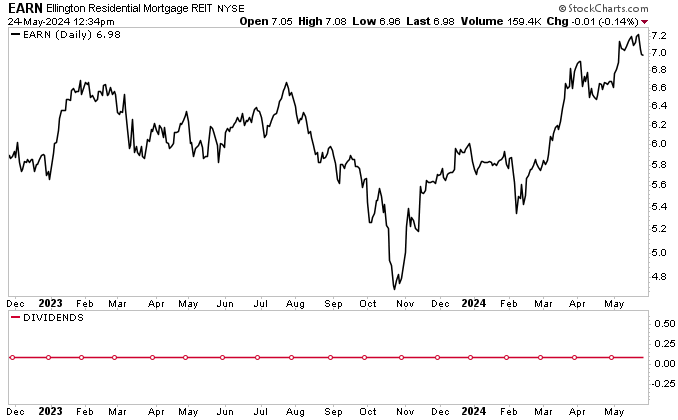Bullish 13.4%-Yield Ellington Credit Stock Pays Monthly

Why EARN Stock Has Been Rising
Ellington Credit Co (NYSE:EARN) is a financial services company that has, like its peers, seen its share price steadily trend higher since the beginning of November 2023.
That’s when the Federal Reserve said it was done raising its key lending rate. In December 2023, the Fed held its rate again, but that time, it also said rate cuts were in the cards. Investors cheered, and interest-rate-sensitive stocks received a lift.
The Fed hasn’t actually announced its highly anticipated reduction in interest rates, but we know it’s coming. The central bank has held its key lending rate in the range of 5.25% to 5.5% since last July, its highest level since 2001.
The reason the Fed hasn’t begun cutting rates yet is that inflation is still too high and the economy is strong, which means it will take longer than previously anticipated for inflation to fall to the central bank’s target of two percent.
This has put the once-expected summer interest rate cuts into question. It now looks like the rate cuts won’t begin until September. Later than expected, but not derailed.
This provides investors with an opportunity to get ahead of the market and find great capital-intensive businesses that provide ultra-high-yield dividends, like Ellington Credit Co.
I wrote about this company in Income Investors in February 2021 and June 2021, but until April 2024, it was known as Ellington Residential Mortgage REIT.
The company was initially formed as a real estate investment trust (REIT) that invested in residential-backed securities. But in late March, the company’s board approved a transformation in its strategy to focus on investing in corporate collateralized loan obligations (CLOs). (Source: “Ellington Residential Announces Strategic Transformation,” Ellington Credit Co, April 1, 2024.)
The company is looking to build upon its current $44.0-million CLO portfolio, with an emphasis on secondary CLO mezzanine debt and equity tranches. Along with the rebranding and new focus, the company opted to no longer be taxed as a REIT.
Ellington Credit Co has also said it intends to convert into a closed-end fund (CEF) later this year. A CEF is a type of mutual fund with a portfolio of securities. Like exchange-traded funds (ETFs), CEFs are traded on the stock market, but unlike ETFs, the number of outstanding shares is fixed. Moreover, CEFs are actively managed, whereas ETFs are not.
What is a CLO? It’s a high-yield, scalable, floating-rate investment alternative to corporate bonds. CLOs are a $970.0-billion asset class within the $12.0-trillion structured credit fixed-income market.
CLOs make money from an actively managed, diverse pool of senior secured corporate loans. These loans are typically secured by a company’s assets, and they rank first in priority of getting paid ahead of unsecured debt, should a borrower ever go bankrupt.
Like any investment, CLOs come with risk, but the combination of diversification, active management, and senior secured loan collateral has resulted in low default rates compared to corporate debt.
Including investment activity through May 13 (the day before the company announced its first-quarter results), Ellington Credit Co’s CLO portfolio stood at $60.0 million. At the end of 2023, the company’s CLO portfolio stood at $17.4 million. (Source: “Ellington Credit Company Reports First Quarter 2024 Results,” Ellington Credit Co, May 14, 2024.)
Ellington Credit Co More Than Doubled CLO Portfolio in Q1
In the first quarter ended March 31, Ellington Credit generated net income of $4.0 million, or $0.20 per share. During the quarter, the company also generated adjusted distributable earnings of $0.27 per share, which was more than enough to cover its dividends for the quarter. (Source: Ibid.)
Also during the first quarter, the company more than doubled its CLO portfolio to $45.1 million. Furthermore, the size of the company’s residential mortgage-backed security (RMBS) holdings increased by 1.5% month-over-month from $728.0 to $739.3 million.
Management Maintains Monthly Dividend of $0.08 Per Share
As noted above, Ellington Credit Co’s first-quarter adjusted distributable earnings were more than enough to cover its associated monthly dividend of $0.08 per share, which is to be paid on June 25. (Source: “Ellington Credit Declares Monthly Common Dividend,” Ellington Credit Co, May 7, 2024.)
As of this writing, that works out to a forward dividend yield of 13.4%.
Looking ahead, management said that once the company’s conversion into a CEF is complete, the new structure should allow Ellington Credit Co to access a more favorable cost of capital to drive future growth. That’s expected to fuel the company’s adjusted distributable earnings and dividend growth.
Ellington Credit Stock Up 20% Year-to-Date
Since the start of November 2023, EARN stock has rallied by an impressive 24% (as of this writing). Currently trading at $6.99 per share, the stock is also up by 20% year-to-date and 16.6% year-over-year.
Ellington Credit stock’s current price is well below its June 2021 record high of $9.36 per share, but the outlook for EARN stock is pretty solid.
Wall Street analysts expect the company’s earnings per share (EPS) to climb from $0.87 to $1.06 per share in 2024 and inch up to $1.11 per share in 2025. (Source: “Ellington Credit Company (EARN),” Yahoo! Finance, last accessed May 24, 2024.)
And we all know that high earnings growth and an encouraging outlook can juice a company’s share price. This has led analysts to provide a 12-month share-price target for EARN stock of $8.00, which points to upside of approximately 15%.

Chart courtesy of StockCharts.com
The Lowdown on Ellington Credit Co
As mentioned earlier, Ellington Credit Co has transitioned from being a REIT that invested in residential-backed securities into a firm that’s focused on investing in CLOs. Since the end of 2023, the company’s CLO portfolio has more than doubled to $60.0 million, and the company has plans to drive that figure above $100.0 million.
Ellington Credit Co’s focus on CLOs is expected to enhance the company’s earnings, stability, book value, and dividend growth.











